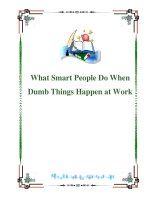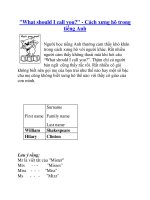What Should I Do with My Life_ - Po Bronson
Bạn đang xem bản rút gọn của tài liệu. Xem và tải ngay bản đầy đủ của tài liệu tại đây (2.51 MB, 1,210 trang )
Contents
DESTINYVS. SELF-CREATED
MEANING
1 An Ordinary Guy
EVEN THE DESTINED STRUGGLE
2 Hunted by Her Cause
DOTHINGS HAPPEN FOR AREASON?
3 Lacking an Off Switch
ATESTOFBEINGTRUE TOONESELF
4 Dropping the Watermelon
THE FEAR OFBEINGIMPRACTICAL
5 The Dharma Adviser
ITS PLACE AMONGTHE
GREATPHILOSOPHICAL QUESTIONS 6
Parasite Entrepreneurism
WORKINGWITH WHAT’S ALREADYTHERE
7 Have You Looked Under the Bed?
NATURAL ENTHUSIASM
8 The Brain Candy Generation
STIMULATION/INTENSITYVS.
SIGNIFICANCE/FULFILLMENT 9 A Toxic
Environment
THE NEED TOIMPRESS PEOPLE ON THEIR
TERMS 10 Certified Apologies
THE CONSEQUENCES OFOFFERINGFALSE
ENCOURAGEMENT
IN ANOTHER CLASS 11 The Umbrella
of Freedom ANYONE CAN FIND THIS
IMPORTANT 12 A College Man
FROMWORKINGCLASS TOEDUCATED CLASS
13 Building a Cathedral THE FEAR YOU
DON’TBELONG 14 The Casino of the
American Economy IT’S SUPPOSED TOBE
HARD
15 On Planet Hug
IS MORE RELIGION THE ANSWER? 16
Getting Oily, Then Even SWITCH SIDES
AFTER AN INJUSTICE 17 Learning Delta
Pride
THE FEAR THATOUR CHOICES ARE
IRREVERSIBLE
TEMPTATIONS VS. ASPIRATIONS
18 A Billion Is Chump Change
IS TURNINGDOWN THE MONEYSTUPID OR
BRAVE? 19 The Crossroads of
Temptation
OVERCOMINGTHE STIGMATHATTHIS
ISN’TIMPORTANT 20 The Lockbox
Fantasy
GETTINGRICH CHANGES YOU
21 The Green Eyeshade
MOTIVATION FROMTHE HEAD VS. THE
HEART 22 After a Brief Period of
Experimentation
DOES LOCATION MATTER?
23 A Tactile Jones
COMPROMISES LEAD TOBOREDOM
24 The Chemical Engineer Who Lacked
a Chemical WHAT’S REAL?
DESTINATION VS. JOURNEY?
25 Guidance, Navigation, and Control
THREE LESSONS FROMONE WHO’S STAYED
PUT 26 The Boom Wrangler Has Many
Reasons to Live
CHANGE, FOR SOME, KEEPS THEMALIVE
27 The Phi Beta Slacker Dances for
Herself
BE YOUR OWN AUDIENCE
28 The Change Junkie Kicks Her Habit
DECIPHERINGTHE URGE TOCHANGE
KNOW THYSELF
29 When the Coin Lands Tails
IS GETTINGTOKNOWMYSELFIMPRACTICAL?
30 My New Start-up
HOWTHE PASTCOLORS PERCEPTION 31 A
Different Kind of Hard Work
REVIVINGWHATYOU NEGLECTED
32 The Toner Queen Unmasks Herself
VALUINGINTERNAL ACCOMPLISHMENTS 33
The Once-Angry Minister
ANEWKIND OFSUCCESS STORY
CHANGES OF SCENERY 34 Ambition
in Neutral
DEEMPHASIZINGTHE QUESTION IN ORDER
TOANSWER IT 35 Nobody Taught Me
THE BENEFITOFBEINGAROUND LIKE-
MINDED PEOPLE 36 The Romantic
Depressive
ENJOYINGPEOPLE
37 Uncomfortable Is Good
REHEARSINGFOR LIFE’S IMPROVISATION 38
Success Formula
GIVINGUP THATIT’S ABOUTYOU 39
Trafficking in Extremes
THE ADVENTURE OFWORKINGABROAD
RELATIONSHIPS AND FAMILY
40 The Twin Who Wanted to Be Unique
STRUGGLINGTOSATISFYDUAL CAREERS 41
H = P > J
WHEN PATHS BEGIN TOPART
42 Ski Bums
WORKINGWITH YOUR SPOUSE
43 Where Fears Hide
THIS IS YOUR OWN RESPONSIBILITY 44 The
Lottery Winner
RESISTINGPARENTS’ PRESSURE
45 The Monkey Law
FINDINGINSPIRATION IN OUR ANCESTRY 46
A Burial with Pinstripes
FEARS ARE INHERITED, TOO
47 Accepting a Gift
WILL I HAVE TOPUTMYASPIRATIONS ASIDE?
48 The Mechanic Gives 100 Percent
CHILDREN HELP YOU REMEMBER WHAT’S
IMPORTANT 49 A Fragile Blow
THE HARDESTTHINGS ARE THE
MOSTLIBERATING
THE APPROPRIATE TIME FRAME
50 Out of My Mind
WHEN IS ITTOOLATE TOSTARTOVER?
51 Contribution X
KEEP IN MIND EVEN WHATYOU
CAN’TDEFINE
52 Twenty Thousand Lives a Year
BUSINESS IS ATOOL TOSUPPORTWHATYOU
BELIEVE 53 Magic Powers
NOBIGPICTURE IS TOOBIG
54 Closing Remarks
THE REWARDS ARE FOR ONLYTHOSE
WHOLISTEN ATTENTIVELY
Exercises and Resources
Acknowledgments
About the Author
Also byPo Bronson
Copyright
For Michele and Luke
What Should I Do
with My Life?
Introduction: Obvious Questions Don’t
Have Obvious Answers FROM YOUR
FEARS COME MISCONCEPTIONS
We are all writing the story of our
life. We want to know what it’s “about,”
what are its themes and which theme is
on the rise. We demand of it something
deeper, or richer, or more substantive.
We want to know where we’re headed
—not to spoil our own ending by ruining
the surprise, but we want to ensure that
when the ending comes, it won’t be
shallow. We will have done something.
We will not have squandered our time
here.
This book is about that urge, that need.
I began this project because I hit that
point in my life. The television show I’d
been writing for was canceled. The
magazines I wrote for had thinned their
pages. My longtime book editor had quit
to pursue theater and film. I was out of
work, and though I could have hustled up
more, I wasn’t sure I should. I felt like
the kinds of stories I’d been telling no
longer worked. They no longer mapped
the depth and drama of human life as I
experienced it.
I found I was intrigued by people
who had unearthed their true calling, or
at least those who were willing to try.
Those who fought with the seduction of
money, intensity, and novelty, but
overcame their allure. Those who broke
away from the chorus to learn the sound
of their own voice. Nothing seemed
more brave to me than facing up to one’s
own identity, and filtering out the chatter
that tells us to be someone we’re not.
What might we learn from those who had
confronted this question?
I decided on the simplest approach
possible: I would express my curiosity
to whoever would listen, trust this
would provoke some leads, and travel
the country tracking down the people
whose stories spoke to me. I had no idea
that sticking to this simple method would
soon take me to so many places I’d
never been, and far deeper into people’s
lives than I’d ever gone as a writer.
I hit on an incredible wellspring of
honest sentiment. Complete strangers
opened their lives and their homes to
me, confessing feelings and events they
hadn’t revealed to their closest friends.
This was at a time when we were losing
our respect for corporate leaders, we no
longer believed new technology would
make our lives better, and the attack on
our freedom made life precious and
weighty. People were reassessing what
mattered to them and what they believed
in.
I heard some nine hundred stories,
spent countless hours corresponding and
on the phone, and came to know about
seventy people closely. I spent time with
them all in person, which was absolutely
necessary. (About fifty are included in
the book.) The word “interview” doesn’t
describe the emotional exchange that
usually occurred. None were friends
when I started, but most were by the time
I was done. These were microwave
friendships, forged with fast blasts of
revelation and bonding, like those
formed quickly in a freshman dorm,
remembered for years. I let them cry in
my arms. I slept on their couches. I sat in
their musty attics, looking through old
photo albums. We went running together.
We traded secrets. I met their parents
and held their children. I went to one’s
wedding. I became symbolically
associated with their turning points.
Many people described how much it
helped them to have me listen; they
talked their way into a greater
understanding of what had transpired
and why.
I was no expert. I had no credentials
as a counselor or academic. I
approached these people as merely “one
of them.” The events of my life had
shredded any theories I used to have
about how to address the question “What
should I do with my life?” I had been
humbled into admitting I knew nothing,
and as I hit the road I was continuously
humbled again by what some of these
people had endured and the wisdom they
seemed to radiate. I learned from them
through inspiration and imitation. I also
learned from the multiplicity of stories
— by comparing how people talked and
what language they invoked, certain
patterns emerged, and I could place a
story in the context of the larger picture.
The flip side to caring for them was
an occasional intrusion. When people
were in midtransition and confused, they
routinely asked for my counseling. This
was always an uneasy role; usually, I
handled this by telling other people’s
stories—“Here’s what this person
found, in a similar situation. . . .” In a
few instances, I was not so passive
when I sensed that my passivity—my
listening mode—was being taken
inappropriately as endorsement. I didn’t
want to be an accomplice to a wrong
turn. So I tried to guide them by
reminding them of their own stated
resolutions. I didn’t handle all these
situations perfectly; I reveal these
moments in the text to show my own
fallibility.
People asked a great many questions
that helped steer my research. Many of
these questions were of the smart-aleck
variety, merely intellectual/devil’s
advocate babble, but it was much more
difficult and challenging to address those
asked from the heart, by people stuck in
the middle of it and honestly confused.
Questions such as:
•
Is it supposed to feel like destiny? If not, is
(experience-derived) self-created
“meaning” legitimate?
•Should I accept mylot, make peace with myambition,
and stop stressing out?
•Whydo I feel guiltyfor thinking about this?
•Should I make moneyfirst, to fund mydream?
•How do I tell the difference between a curiosityand a
passion?
•How do I weigh making myself a better person
against external achievements?
•When do I need to change mysituation, and when is
itmethat needs to change?
• What should I tell myparents, who worryabout
me?
•If I have a child, will myfrustration over mywork go
away?
•What will it feel like when I get there? (How will I
know I’m there?)
These were screamingly obvious
questions, but it seemed they were
almost so obvious that we hadn’t
publicly collected how we’ve learned to
answer them—as if the answers should
be obvious too, which they’re not. Too
often we’re reticent about these issues.
Talking about them can seem so
fruitless, meanwhile inflaming anxiety
and diverting us from the other things we
have more control over, and can do.
Yes, but it can also strengthen our
resolve and shield us from distractions. I
found that the biggest obstacle to
answering the question this book poses
is that people don’t give themselves
permission to take it seriously. At the
risk of being fruitless, let this book be a
safe place for a discussion.
This book does not research the
history of its question. I don’t quote
experts, though I interviewed some, and
I don’t quote literature unless it was
quoted to me by someone I wrote about.
I didn’t spend time in the library to write
this book. Those sources of wisdom felt
too abstract compared to the hard-earned
record of those who actually took action,
changed their life, and enjoyed or
suffered the consequences.
The people in this book are ordinary
people. By that I mean they did not have
available to them resources or character
traits that gave them an uncommon
advantage in pursuing their dream. Some
have succeeded, many have not. Only
one, in my mind, is saintly. Only two had
what accountants call “financial
independence.” Only two were so smart
that they’d succeed at anything they
chose, though having more choices made
answering the question that much harder.
None were gypsies by nature, such free
spirits that they didn’t need or crave a
place to call their own, though some
eventually found their solace in learning
to live that way. Only two asked me for
my sign. Only two asked me not to use
their real names. Otherwise, they were
people who faced up to it, armed with
only their weaknesses, equipped with
only their fears. I chose stories that I
hoped would encourage reflection and
offer solace, not ones that merely
entertained.
Spending time with them affected me
subtly. Afterward, I was always spent,
and needed to recharge on the familiar
patterns of my family, the writers’
Grotto, and my soccer teams. I became
hyperaware of what mattered to me and
what was merely that week’s noise
intruding on my life. It stripped away
some of the ways I had colored my past,
and often I was visited by old friends in
my dreams. I became more honest in
person, less contrived in my writing.
They helped me find my own story. They
wanted to know how I’d come to be a
writer, and how I’d recently become a
husband (for the second time) and a
father (for the first time). I’d never
written about my own journey, never
thought it was a story worth telling, but
hearing their stories helped me tell my
own in a way that it finally did have
some oomph. To some it was
inspiration, and to others it was
kinship.Okay, he gets it.
My biggest surprise was how being
a new dad folded into the book, and how
I face this question now that I have a
family. Writing hadn’t come easily to
me, and I’ve had to be very protective of
my love for it. I was once so afraid that
being a parent was incompatible with
being a writer. The travel, the intense
concentration. For years this fear had
stopped me from mixing the two.
Somehow, in a year in which our son,
Luke, was born, and my wife, Michele, a
molecular immunologist, was putting a
drug through the FDA’s approval
process, I found the time and the room in
my heart for this enormous project. I
took my family with me whenever I
could, which was most of the time. In his
first year Luke went on seventeen trips
of up to ten days in length, including
weeks in London and Hong Kong, which
he loved because it was hot. Now it
seems like a miracle.
It’s a far different book from what I
originally envisioned. It reflects what I
found, not what I predicted. I didn’t
write a single person’s story until I had
gotten to know two-thirds of them, and
even then their meaning was just
beginning to show itself. Nowhere is this
more apparent than in the way I’ve
arranged these stories. Since my method
conveys how I’m implicitly suggesting
we think about this question— and since
figuring out how to do this didn’t come
easily—an explanation is probably
necessary.
This book doesn’t follow a
conventional outline. Every week I
sketched out another scenario for
grouping these people’s lives. Most
people had fair claim to several groups.
Too many never fit any. It was always
clear that the benefits of categorization
were outweighed by the harm in
chopping their lives down to an
anecdote.
I couldn’t shake the urge to tame this
question by shackling it with some
orderly form. But the human soul resists









